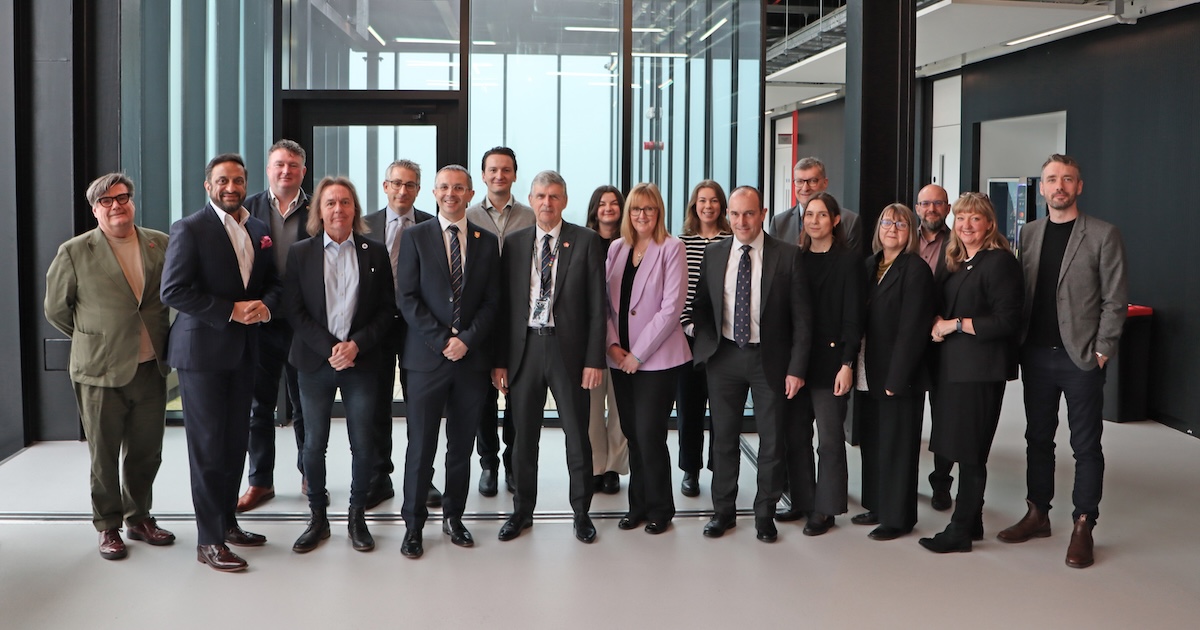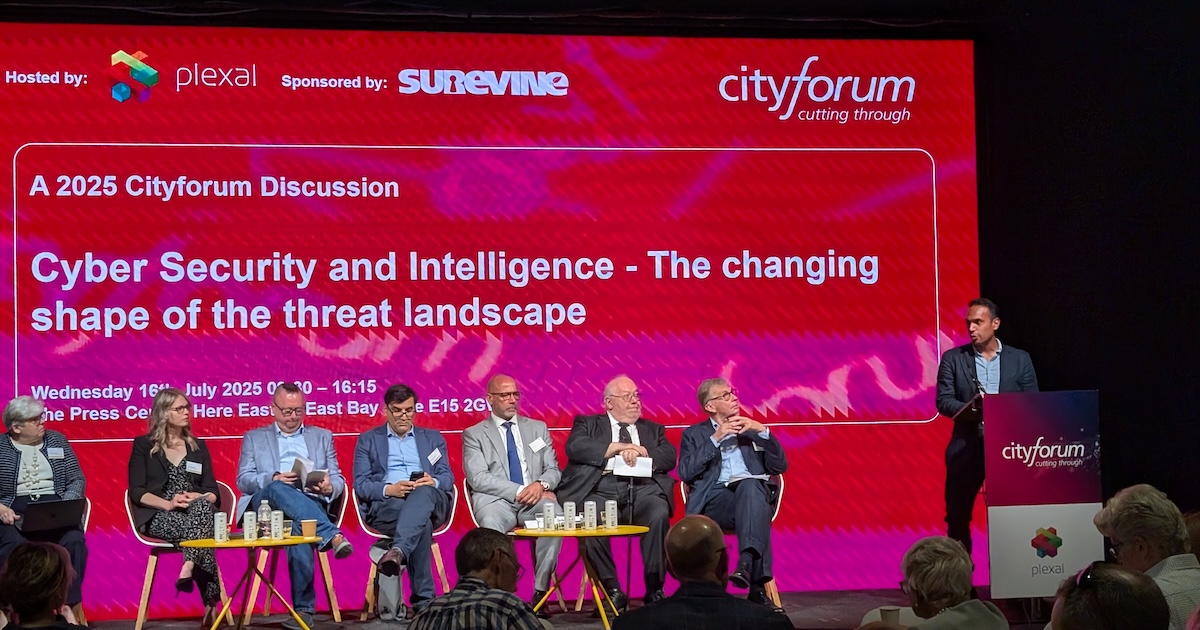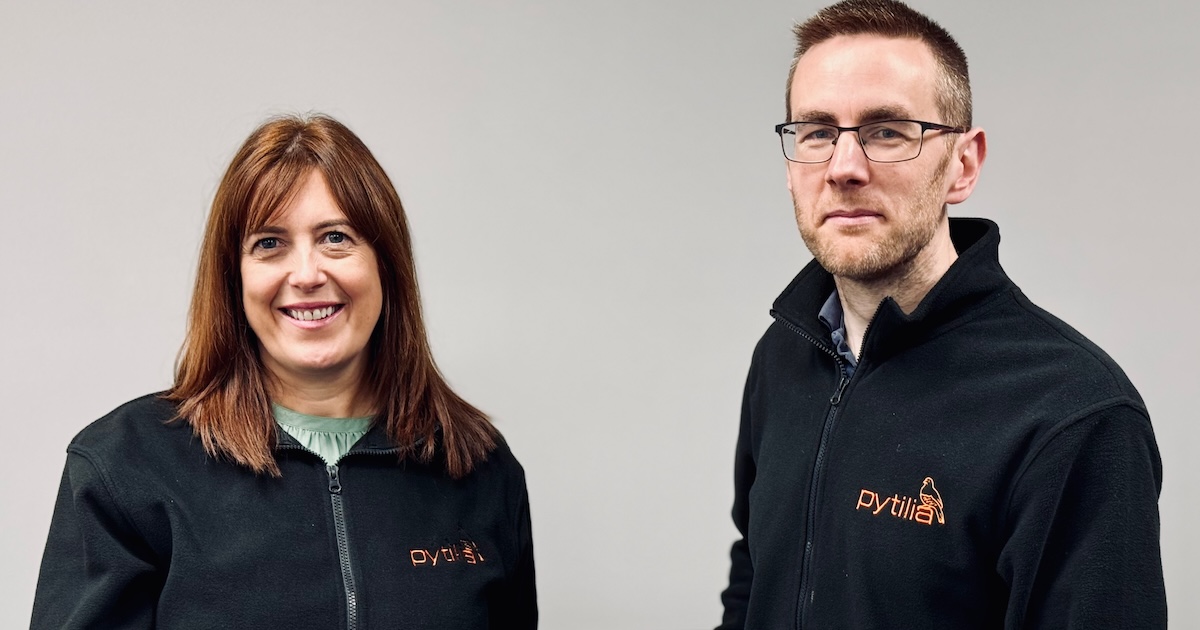The national security sector is of increased importance in the UK. Global geopolitics and a rapidly growing technology super-cycle means the UK must position itself as a leader in technology for the security sector and the North West is leading this charge.
GCHQ has opened a hub in Manchester and the National Cyber Force (NCF) is establishing its headquarters in Lancashire. Combined with long-standing expertise in the academic and private sector (including University of Central Lancashire, BAE Systems and Lancaster University), these factors mean the North West has a once-in-a-generation opportunity to lead the UK’s cyber security and technology revolution.
Now is the time to secure a clear, unified strategy that drives economic growth, strengthens national security and cements the North West’s unique position as globally significant technology hub.
On Friday 28th February 2025, Plexal hosted a Cyber Breakfast Roundtable as part of the Convention of the North (COTN) in Preston, Lancashire, to move this important agenda forward. The roundtable discussion was facilitated by Russell Gundry, Senior Director of Clusters at Plexal, as well as Plexal CEO Andrew Roughan and featured key figures from the regional cyber ecosystem including:
- National security representatives from the UK Government
- Lancaster County Council
- Colleagues from the Department for Science, Innovation and Technology (DSIT)
- Representatives from Lancaster University and University of Central Lancashire (UCLan)
- Greater Manchester Combined Authority
- Private sector companies operating in the cyber sector
“By spending more on defence, we will deliver the stability that underpins economic growth, and will unlock prosperity through new jobs, skills and opportunity across the country.”
– Prime Minister Keir Starmer, 25th February 2025
The UK Government recently announced further investment by the UK Government into security, with plans to reach 2.5% of GDP spending on defence from April 2027. This, coupled with the rapid growth of technology which has been seen over the past five years along with the net zero objectives, raises a poignant question: “How does the North West as a region, and more broadly the UK as a nation, gather around and utilise regional partnerships for broader collaboration and growth?” This discussion focused on how Lancashire and Greater Manchester can seize this moment to establish themselves as a collective force to be reckoned with.
Andy Walker of Lancashire County Council brought future plans into perspective, speaking about the growth plan which has been taking shape at COTN, working together with other parts of the North West (particularly Manchester). “We need to put forward a convincing case so that we can realise the benefits of the investments which are taking place in the region,” Andy established.
Niall Cronin, Cyber Principal at the Greater Manchester Combined Authority added a Greater Manchester perspective on the conversation. “This is a multi-faceted opportunity,” he said. “This is about more than cyber – it relates to new and emerging advanced technologies such as AI, advanced materials, space and robotics. As the largest UK digital cluster outside London, Greater Manchester offers a critical mass of strengths and assets across these technologies.”
Professor Simon Cook from Lancaster University followed up with the key question: “How do we set ourselves up for success as national security organisations move further north? Bringing GCHQ to Manchester was welcomed by the local government, academic and business communities. The same is true for NCF in Lancashire and we need to do our best to ensure this message gets across to the various teams within NCF.”
He continued: “While the NW ecosystem is ready to welcome the NCF with open arms, we also need to help NCF to ensure that their internal culture and processes allow them to be sufficiently open and able to engage with that ecosystem to mutual benefit, while, of course, taking into consideration all the necessary security constraints.”
Around this key topic of security, but also local involvement, the roundtable participants agreed the ecosystem in the North West must be set up by allowing agencies to access local resources in a way which is secure and comfortable for them. Taking learnings from success stories such as Manchester and applying those principles to the wider North West will be key in developing a successfully integrated ecosystem.
At the heart of this vision is talent. The North West must continue to differentiate itself as the best place to build a career in cyber security, advanced technology and national security.
How can the cyber ecosystem access the best of new industrial and academic talent across Lancashire, Manchester and the wider North West?
Dr Michele Lawty-Jones, Director of the Lancashire Skills and Employment Hub, highlighted: “There is a broad breadth of opportunity in tech, cyber and AI. However, there needs to be more visibility of opportunities for students and future talent to join.” Indeed, several of the roundtable participants agreed that there’s a need to be proactive in bringing opportunities to students. The challenge is twofold:
- Ensuring the region’s universities, businesses and government agencies work together to access and develop the best industrial and academic talent.
- Retaining and attracting a highly skilled workforce by offering fulfilling, long-term career pathways.
“We need to be clear to our students on what skills need to be learned to get into these institutions and ecosystems.” – Professor StJohn Crean, Pro Vice Chancellor, University of Central Lancashire
The region already hosts a dynamic cyber environment, with several initiatives showing promise, both at the academic and industry level. Michele highlighted the recent Lancashire Cyber Festival Education Week, which featured activities and events around cyber-related topics. The festival engaged over 12,000 residents in hands on activities – students from primary school level through to college and higher education. “We need to keep replicating that, get deeper with the skills, ensure that we’re inspiring and upskilling our children and young people to secure these fabulous job opportunities,” Michele continued.
Andrew Elliot, Director at the Department of Science, Innovation and Technology, brought his perspective to the discussion. “There’s a lot of work going on in the region – we’re seeing real change,” he shared. “We can already see that there’s a big shift in cyber locations and that investments are paying off in the North West as well as the North East. One example is the engagement levels in schools. When it comes to gender parity balance on tech subjects, this is being met more in the North, because there’s a continual focus on the subject.”
Bringing these elements together, the discussion moved on to measures of success.
When we look at this project five years down the line, what makes the project successful?
Given the nature of the projects taking place in the cyber ecosystem in the area, there’s little doubt some of these objectives will be operational and not public-facing. However, the participants of the roundtable agreed that there will be outward-facing factors which can be used to measure success:
- Attracting talent. If talent, in terms of the existing workforce in cyber as well as students, can be brought into the North West region, that’ll be a measure of success of the project overall.
- Developing skills. The employment model has changed. There’s no longer an expectation of workers to remain in a particular organisation or programme their whole career. Instead, the region must build a dynamic talent ecosystem where individuals can move between government, industry and academia, developing their expertise while contributing to national security.
- Focus on prosperity and efficiency. The latter is often missing and is important. If a project is both prosperous and efficient, that would be a very attractive result for the government and taxpayer funds.
Russell Gundry, Senior Director at Plexal, summarised: “To make this happen, the region must do more than just attract investment – it must deliver results. Success will depend on forging stronger partnerships between key stakeholders including the NCF, regional authorities and industry leaders to accelerate the Cyber Corridor initiative and create a globally competitive technology ecosystem.
“This means securing the necessary infrastructure, ensuring investment flows into the right areas and fostering an innovation-led economy that not only supports cyber security but also AI, advanced materials, energy security and, crucially, the intersections between these technologies and the outcomes they enable.”


